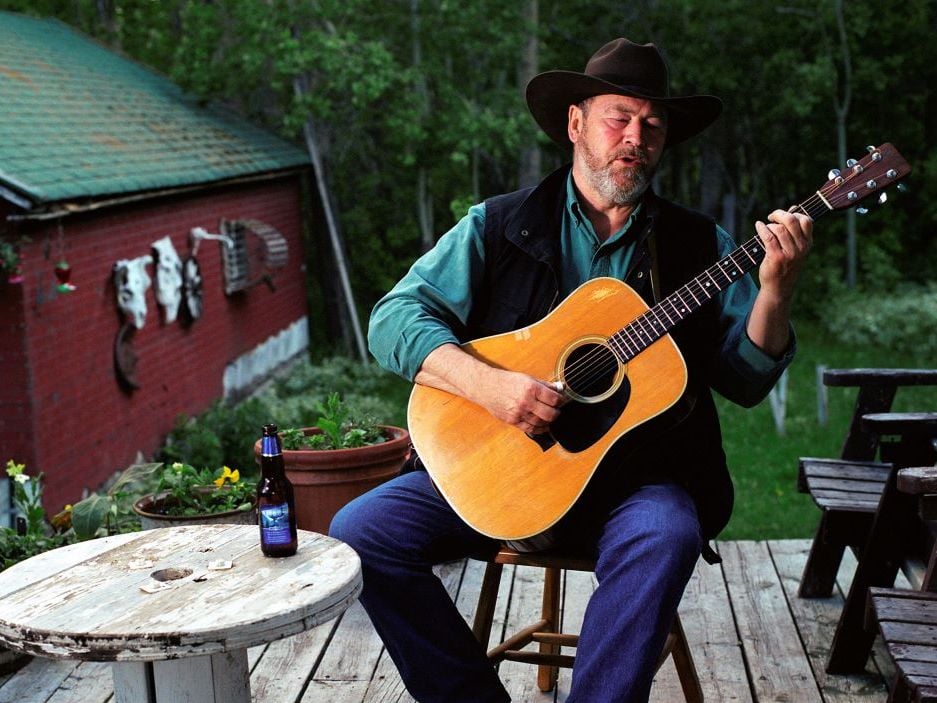“All promise of rain is just sky humour.” — Sid Marty
At the base of the Livingstone Range, just south of Oldman River in southern Alberta’s Blackfoot country, lives Sid Marty, a genial bear of a poet, along with his wife and muse, Myrna.
The couple has long abided in an old wooden house with few straight corners. They often joke that the building just might please the likes of Mr. and Mrs. Mole. A posse of aspens shelters their home from the ever-present wind.
On any given day Marty, who comfortably fills a Stetson, can be found helping Myrna in the garden or repairing an old ATV dubbed “the Anti-Christ.”
Marty, you should know, curates a workshop that resembles an 18th-century museum. He calls it his “Little Shop of Horrors.”
Every morning Marty treks to his writing shed, a solitary one-minute commute. “The brooding pen,” as he calls it, is not much bigger than a closet or a bat cave.
Once there, Marty labours away at what he set out to do some 50 years ago, “to fill what I saw as a void in the poetic response to the mountains and plains of Alberta.”
In the shack Marty, a master craftsman, continues to polish his poems and songs about the subtle glories and vast vicissitudes of the Rocky Mountain West minus the clamour of Calgary. (Marty doesn’t care much for what he calls “Dildoville,” a city bedazzled by its erect concrete towers.)
Some days Marty will perform his meditative work on a Martin guitar, and other times with the impure clay of words. “With poetry and music there is always magic involved,” he says. Myrna, Marty’s soulmate, chimes in and agrees. “There is magic, and it is mysterious and amazing.”
My visit on a recent sunny afternoon is but the latest of many. I have known Sid Marty for 30 years and my cabin lies across the valley from his.
Marty is something of a rare western bard. He is a singer-songwriter, a witty storyteller, a poet par excellence and an artist who never became a star because, as the U.S. singer Guy Clark once explained, “you can’t be both.”
Marty is also a legendary conservationist who has fought dams, coal mines, the logging of watersheds and other foolish notions regally dressed as progress. (And he’ll be the first to admit that “being an environmentalist in Alberta is like being a Boy Scout in hell.”)
Yet Marty has amassed so many accomplishments in so many different forms over the years that he routinely confounds people. Some recognize him as an award winning non-fiction writer (his Men for the Mountains is a national classic about the parks service) while others know him only as a folkie with a voice as resonant as Stan Rogers’ (he even opened for that balladeer once).
Many critics also can’t get their heads around the fact that the author of four poetry books is the same folk artist who brushed shoulders with the likes of David Wiffen and Joni Mitchell in Calgary’s Depression Coffee House in the ’60s. (He has since produced two memorable and critically acclaimed albums: Elsewhere and Let the River Run.)
And then of course comes the poetry, his first love. These days whenever someone asks the man what kind of poetry he writes, Marty dryly replies that he does both kinds: “country and western.”
Both genres are on high display in Marty’s latest book, Oldman’s River: New and Collected Poems, published by NeWest Press. It can be read as a memoir in verse, in which he ponders living in a mountainous world over five decades. Sometimes it takes a poet to remind us that knowing and respecting a geography that defies gravity is often the path to understanding our own hearts. One informs the other, and we are nothing without that rootedness of place, says Marty.
In many ways that’s what Marty’s poetry does. It speaks for the inchoate, the silent rocks, the burbling headwaters, a dead hawk, jumping elk and roaming grizzlies. It gives voice to the voiceless in our natural lives, and it reminds our selfish kind that this world was not created just for a two-legged mammal and its machines.
As Marty tells it, poetry arrived in his youth as something of an obsession: “You don’t choose poetry, it chooses you. It is not something you can avoid. You are compelled to do it.”
Of course, Marty never suffered “any illusions about big sales with a poetry book either,” he adds with a gruff laugh.
His influences include the beat poet Gary Snyder, Leonard Cohen, Charles Bukowski and Earle Birney. Also the 13th-century poet François Villon, who served as the inspiration for one of Marty’s most haunting songs, “The Snows of Yesteryear.”
But Marty’s earthy style has some things in common with the works of the U.S. poet Mary Oliver or the Chilean Pablo Neruda. Like Oliver, he gives voice to the natural world and asks that we pay attention to the small lives around us. And like Neruda, he celebrates the everyday tools of life from knives to chainsaws.
Marty, a vital 79, still remembers the day when poetry held a higher place in Canada’s imagination. That’s when the publication of a book such as Storm Warning: The New Canadian Poets (a 1971 collection edited by Al Purdy that included Marty’s early work) was reviewed from coast to coast with acclaim.
That doesn’t happen anymore. And scarcely a word has been written about Oldman’s River even though it just received a special jury mention for fiction and poetry at the Banff Mountain Book Competition. The judges noted that his “lyrical voice, rooted in personal experience, evokes the mountains of Western Canada with unflinching insight and authenticity.”
Marty fell in love with the mountains when he worked at Lake O’Hara Lodge first as “dish pig” and later as a park warden in 1966. “It was an enchanting place for a 17-year-old from Medicine Hat,” he recalls.
Amid majestic peaks, he hiked, climbed and repaired hiking trails. He belayed and rappelled. He hung out with old Swiss guides who travelled like mountain goats and loved the great rocks knowing that they would not love them back.
“The mountains kind of seeped into my soul and became part of me,” says Marty. Their peaks and crags and switchbacks now people his songs, poems and non-fiction books like family members.
He also knows this grand subject intimately. He worked for the parks service as a backcountry warden in Jasper, Yoho, Banff and Prince Albert for the decade spanning 1966 to 1978, often composing poems in the saddle. When not rescuing foolhardy tourists or arresting reckless poachers, he wrote odes to the headwaters where all life begins in the West.
As a consequence, mountain language anchors and fortifies much of the poetry in Oldman’s River. Landscapes, as the writer Robert Macfarlane has observed, give birth to a diversity of “terms for particular aspects of terrain, elements, light and creaturely life, or resonant place names.” And when those words disappear, so too does our understanding of how to live in these places.
To protect such geographic memories, Marty offers poems about “jinglin’ ponies” (wrangling up horses at dawn left to graze overnight in the mountains) and another about “siwashing” through untracked terrain. “Call it ’siwashing / what we do out here when we need to go through places / that do not seem desirable.”
An array of western characters people Oldman’s River. They include a mischievous park warden who left carved wooden faces on high mountain trails to startle hikers as well as an old cowboy who once roped urban bar sitters in their chairs.
And then there are many creatures big and small — sure-footed horses, dead hawks and singing coyotes. There is even a humorous ode to the little brown bat that once dropped scat “splish splash” in Marty’s coffee. (Marty is one of those rare laughing poets.)
Bears, of course, inhabit many poems including a ghostly grizzly that mauled four people in Banff. Marty deftly describes the beast as a “black-robed Justice of the Peace.” (The poem “Swamp King” later became the subject of his celebrated book The Black Grizzly of Whiskey Creek.)
In a world increasingly directed by algorithms and mechanical thinking, Marty thinks poetry matters more than ever. “Why is it still important?” he offers. “It connects us with what universal truths that are still left. Real poetry is divorced from the economy,” he adds.
“It is an opportunity to cut through the grain of life and get to the essence of living. It is also a celebration of the vitality of the English language.”
And so Marty continues his daily commute to the brooding pen to perform more magic. Why still?
“The idea is to get better and to write a poem or book better than the one before. To discover something new that moves you.”
From Oldman’s River: New and Collected Poems:
THE QUESTION
The hawk lay on the road all day
like a small demon in love with earth
Its plumed fingers strummed the dust
when drunken winds went shuffling past
As if a question had been asked
by this hard mouth that gaped
from a gargoyle’s face turned up
while the sun’s bronze tongue
lingered on the broken neck
The hawk was there that evening
So I stopped and moved it
to the grass
It was barred with black and brown
and grey, and in the talons
clutched and locked
There was a field mouse
also dead, also amazed
Sid Marty will be speaking at the Banff Centre Mountain Film and Book Festival on Nov. 3 at the Max Bell Auditorium. And he and his band, Wailback, will perform at Asylum for Art in Calgary Nov. 17. ![]()
Read more: Books, Music, Alberta, Environment

















Tyee Commenting Guidelines
Comments that violate guidelines risk being deleted, and violations may result in a temporary or permanent user ban. Maintain the spirit of good conversation to stay in the discussion and be patient with moderators. Comments are reviewed regularly but not in real time.
Do:
Do not: